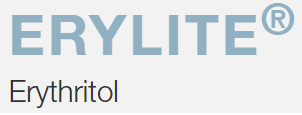Description
Chemically, it is a four-carbon sugar alcohol (polyol). ERYLITE® is produced by microbial fermentation of a carbohydrate substrate. It is the only sugar alcohol that is considered to be natural.
ERYLITE® occurs naturally in a wide variety of foods, including many fruits and mushrooms, as well as in fermented foods such as cheese, wine, beer, and soy sauce. Its sweetening profile is very close to sucrose, while its sweetness amounts up to 60 – 70 % of the sweetness of sucrose.
ERYLITE®’s metabolic profile is unique. It is readily absorbed in the small intestine and is excreted unchanged. Only about 5 % of the intrinsic caloric value of ERYLITE® is provided to the body. This metabolic profile leads to the extremely low effective caloric value of ERYLITE®.
ERYLITE® is non-cariogenic and has a zero glycemic index. ERYLITE® has the highest digestive tolerance of all polyols used in food.
Jungbunzlauer ERYLITE® is supplied in accordance with the current requirements of the Food Chemical Codex (FCC) and the European food additives purity criteria on E968.
ERYLITE® is available in a granular fine grade.
ERYLITE® is available in 20 kg net polyethylene bags.
Applications:
Food
Beverages
Healthcare
Personal care
Pharma
Legal Aspects:
In the EU there is a general approval for erythritol (E968) in food with limitation in particular applications (according to Annex II of Regulation (EC) No 1333/2008).
Erythritol is Generally Recognized As Safe (GRAS), in accordance with the US Food and Drug Administration (FDA) and current GMP, with upper limits for specific applications.
CODEX ALIMENTARIUS recognizes erythritol (INS 968) as Sweetener in “General Standard for Food Additives” as “Additives permitted for use in food in general, unless otherwise specified, in accordance with GMP”.
In Japan, Erythritol is approved as food ingredient.
Brand owner:
Country:
Switzerland

